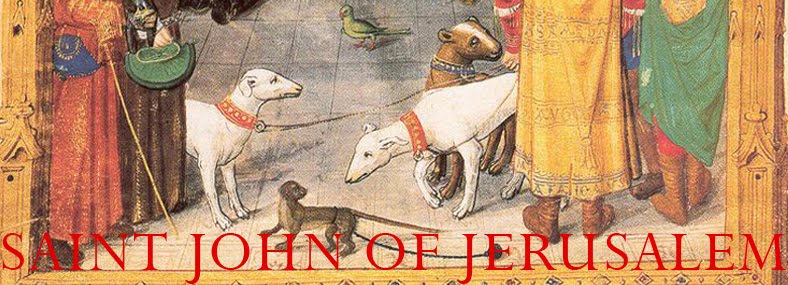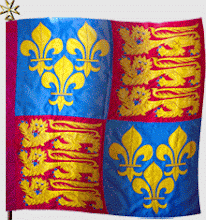The very moving homily was preached by Monsignor Antony Conlon, Chaplain of the Grand Priory. The text is given below.
REQUIESCANT IN PACE
"One of the principal signs of genuine religion is charity. The very last command that Our Lord gave to His disciples on the night before his death on the cross was “Love one another as I have loved you… By this love you have for one another everyone will know that you are my disciples”. (John 13: 34-35). Regarding charity shown to those most in need Christ also said “…insofar as you did this to one of the least of these brothers of mine, you did it to me” (Matt. 25: 40). The basis of God’s judgement of us and the measure of our reward will be decided upon our response to these words of our Saviour. That is what He has told us. This is one reason why Christians have sought and found ways through the centuries to put this teaching into practice. It can be seen in individuals and in groups where the love of God is the primary motive for working with and for others to bring about the relief of suffering and to see Christ especially in those who are most vulnerable and in need. Our service to them will be what mostly counts to our credit at the end of our lives. This kindness extends not only to the material help we give to others but also to the spiritual support of our prayers, through life and in death.
"One of the most consoling aspects of our Catholic faith is that charity towards each other does not end with death. The soul cherished by the community and loved by family, friends and fellows can benefit from their prayers in its journey to God after death. This is what we mean when we consider and engage in prayer for the deceased. We want that love and respect which we felt for them in life to carry on bringing them support and comfort beyond the grave. In the sadness of our bereavement it also comforts us to know that any loosening of the ties of love in this life can be mended by prayer directed to God for the departed. No opportunity to pray for the dead should be neglected. Few writers have been able to express this so movingly and eloquently as Blessed John Henry Newman. His spiritual legacy is one of deep faith and intellectual conviction of the most elevated kind. He never tired of explaining and teaching the faith. During his life he was part of a religious fraternity and was able to correspond with so many on matters of faith. He also wrote poetry with religion as its theme. Probably his most famous work, later set to music by Sir Edward Elgar, is the “Dream of Gerontius”. It is the story of a soul’s passing from this earth to judgement and its realisation that though redeemed and longing to live in the blessed sight of God it must undergo a process of further purification in order to be completely at home in heaven.
"Newman’s poem is in the form of a dialogue between Gerontius and the Angel who conducts him through and beyond the gateway from earthly life to a world of spiritual intensity unfamiliar until the moment of death. The soul travels but is aware of those left behind; especially their prayers for the departed. “I hear the voices that I left on earth…the friends… who say the Subvenite with the priest”. In the final verses of the poem the Angel comforts Gerontius with the reminder that his time of waiting will not be a lonely one for “Angels to whom the willing task is given, shall tend and nurse and lull thee as thou liest: and Masses on the earth and prayers in heaven, shall aid thee at the throne of the most Highest”.
"Dear confreres and brethren gathered here this evening, this is the holy and charitable enterprise in which we are all engaged. In our thoughts and prayers are individuals whom we have known and loved in life. Each of us will have a particular memory that is most personal to us alone and by which the flame of affection is kindled in our minds and hearts. In a wider sense we may also be aware of the contribution to the general good made by those for whom we are praying. Especially within the traditions and purposes of our Order, founded for the relief of the misery of poverty and sickness and the defence of the Catholic faith, our deceased members have played their part both by their practical support and their prayers. Like the devoted servants praised in the Gospel, they have used their talents for the benefit of others and to enhance the good name of the Order. In this connection we call to mind the late Tom Ely whose widow, Rachel and family members and friends we are glad to welcome among us this evening. Tom was instrumental in setting up and became a trustee of the Order of St John Care Trust in Lincoln and later worked for ten years as clerk to the Trustees. The benefits to the community of the care homes administered by it will be an enduring tribute to his initiatives and a memorial of which his family and the Order can be justly proud.
"The form of the Mass we follow is the more ancient rite, which since the very foundation of our Order has accompanied the funeral rites of so many of its members. The chants and prayers are meant to be an aid to serious reflection upon the transitory quality of life and the solemnity and mystery of death. As the Mass is the source of all sanctity it is also the sign of our corporate solidarity with, in and through Christ. May all here present derive both consolation and comfort from these rites and the souls of those for whom they are offered, be blessed with pardon from God and in His providential care for them, with joy in the life that never ends. May those souls in turn, who achieve the heavenly reward for which we pray, be mindful of us in their future blessed state and aid us to reach that redemption for which Christ died once upon the Cross."












